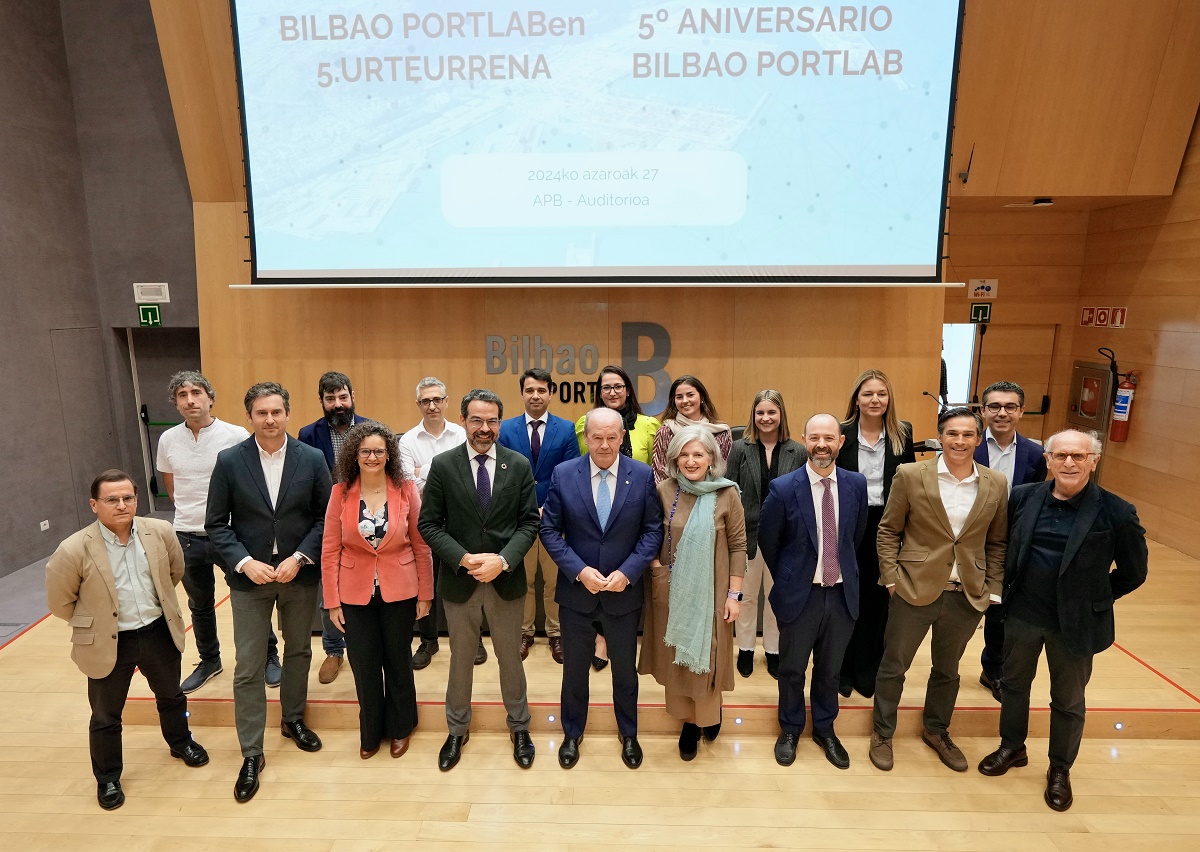Five years have now passed since Bilbao PortLab was founded to provide support for businesses and organisations of the Bilbao port-logistics community in their transition towards a smarter, nimbler and more sustainable future. Throughout this time, the guiding concept has been open innovation, working both on projects generated internally and attracting others from outside.
The innovation hub of the Port of Bilbao began its activity in 2019 on the initiative of the Port Authority who, at the same time, proposed it form part of the Bilbao Port and River Foundation. The first Port Lab to be set up in a Spanish port, Bilbao PortLab has from the outset had a working team that has promoted and coordinated its activities from a coworking space in the Port itself. In the first year, 40 innovative solutions were identified, and today, that number exceeds 900, enabling an innovation ecosystem to be created in which both public and private collaboration have been key to launching and developing projects of all kinds.
The initial objective was twofold: to attract innovation, and to ensure that the funds made available to the State Ports innovation fund reached businesses in the Basque Country and, in particular, companies in the port itself. Gradually, this work process has borne fruit, supporting a large number of projects that have been awarded funds both from the Ports 4.0 programme and from other sources of funding due to their quality, interest factor, coherence and innovative nature. A total of 51 projects have been rolled out in different areas of activity such as digitalisation, logistics efficiency, safety and security and energy and sustainability, enabling companies in the port community to gain first-hand knowledge of technologies which they may or may not later integrate into their own processes, services and/or business models.
With the collaboration and support of the Bilbao Port Authority and the port community of Bilbao, Bilbao PortLab has managed to begin to overcome the lack of interest shown by some companies in innovation and to take action as an enabler of new technologies. Likewise, it has supported companies outside the port to increase their degree of technological development through proofs of concept, prototypes and pilots, thus reducing the technological risk for companies in the port community, which in turn generates a more confident approach towards risk-taking, change and experimentation.
On the occasion of PortLab’s fifth anniversary, the President of the Bilbao Port Authority, Ricardo Barkala, highlighted that “innovation is a fundamental factor for improving competitiveness and, in turn, is essential if we are to adapt to and prosper in the face of a constantly changing environment. The Port Authority promoted this hub and supports companies on this path of innovation, because the role of Port Authorities is shifting from its current model as a landlord to one in which its predominant role is to be a driving force for the community”. Barkala went on to point out that “in the face of uncertainty, we must commit to innovation as one of the factors that promotes the ability to respond rapidly to change, and in the face of complex problems, collaboration between different people is essential, as is promoting co-creation”. He encouraged companies to take the leap, pointing out that “change, and innovation itself, entails risk, but sometimes the greatest risk is not innovating. Our hub also minimises risk by developing proofs of concept and pilots through which impact can be measured”.
For her part, Nagore Ardanza, coordinator of Bilbao PortLab, pointed out the importance of ambidexterity for an organisation. “An ambidextrous organisation”, she explained, “exploits its current value proposition in the market while exploring new opportunities, and this is where innovation is very present and where our PortLab comes into play”. Though a large part of her time is spent on surveillance and scouting, “the most important part is connecting port companies with innovative companies, in a very personalised way, promoting collaboration between the two parties and trying to ensure they speak the same language so that they can understand and complement each other when it comes to solving the challenges facing their businesses”.
For José Luis García-Mochales, Head of the Innovation Area at the Port Authority, Bilbao PortLab promotes, above all, innovation through collaboration. “The companies of the port community must look beyond the limits of the port, and we make it easier for them to find out what’s going on outside in universities, in startups, in large companies, in technology centres and/or in other sectors, to learn about it and adapt it to the specific needs of the port”. In short, the idea is to “normalise innovation, to make companies and organisations understand that innovating can be as simple as identifying the small or big challenges facing us and working collaboratively”.
The organisers thanked the companies in the port logistics community and the different areas of the Port Authority for the work done throughout these five years in facilitating and supporting projects, in making it possible to see how enabling technologies work and enabling progress to be made in adopting them. “We need to be ‘early adopters’ rather than ‘fast followers’ of technology”, they stressed. They also thanked their Advisory Committee, consisting of the members of the Executive Committee of the Port Authority, representatives of the State Ports Authority, the Basque Business Development Agency (SPRI), the Bizkaia Provincial Council, BEAZ and Seed Capital Bizkaia (both companies belonging to the Bizkaia Provincial Council), UniportBilbao, the Basque Maritime Forum, the Basque Mobility and Logistic Cluster, Tecnalia, Innobasque, Orkestra and the University of the Basque Country (UPV-EHU), the University of Deusto and the University of Mondragón, for their work and support.
Neither fear, nor shame, nor laziness
The event marking the fifth anniversary of Bilbao PortLab was attended by over a hundred organisations, drawn both from the port community and innovative companies themselves. One stand-out feature of the event was an inspirational talk given by Juanjo Azcarate, former President and now Advisor to the CCC (Centre for Professional Studies), entitled ‘Neither fear, nor shame, nor laziness’, a title which, in the words of the organisers, “we identify with and share when it comes to inviting companies to innovate with the network intrinsic to a hub that supports them, listens to them, advises them, seeks funding and conducts pilot tests”.
The event also included a presentation by Jose Llorca, Head of Innovation at the State Ports Authority, who provided an insight into ports in the medium term, with special emphasis on data, data management, and new models in areas such as energy that could potentially bring about changes in governance.
Finally, five case studies were also presented, two from different areas of the Bilbao Port Authority (equipment and environment) and three from companies in the port community (Tradebe, Petronor and Toro y Betolaza). These organisations presented the projects they have developed or are currently taking forward in the Port of Bilbao together with SDLE, Suprasys, Navozyme, Siport21 and Nuavis.

 Port access
Port access
